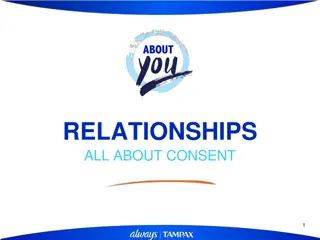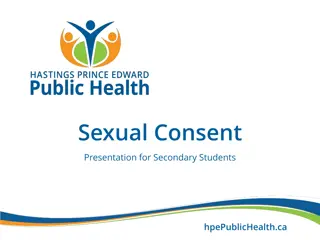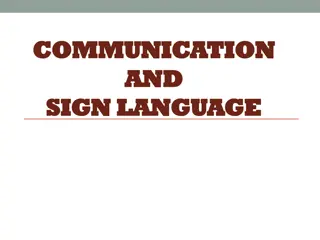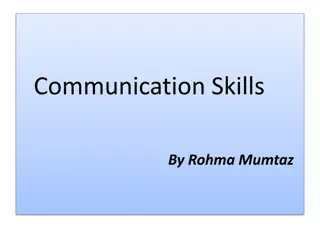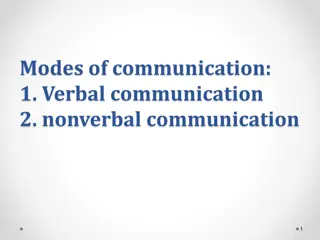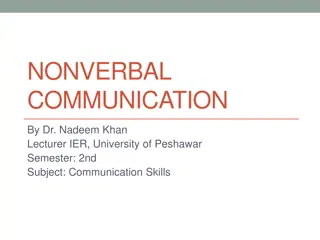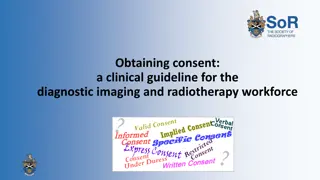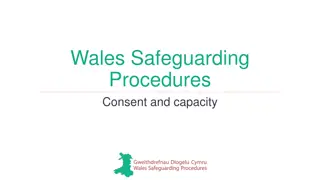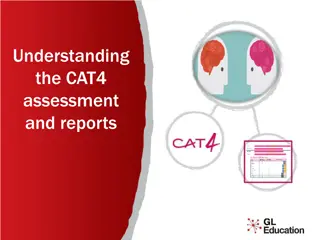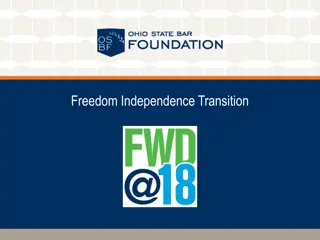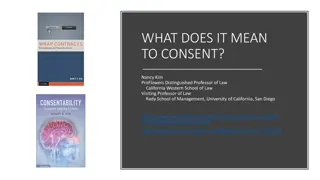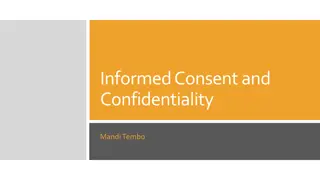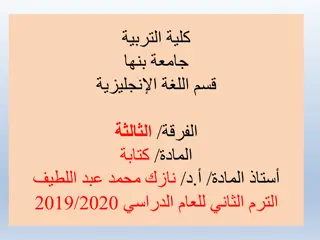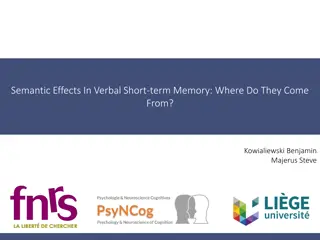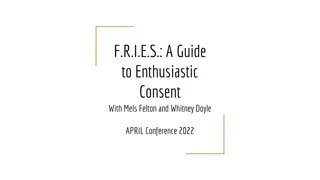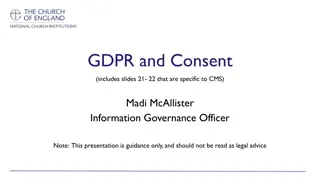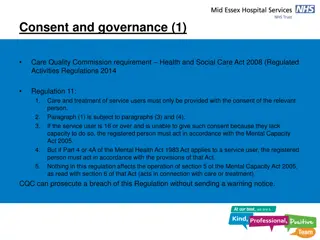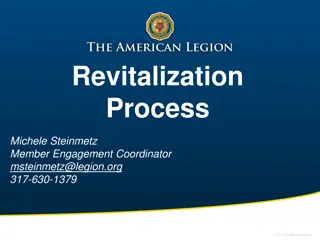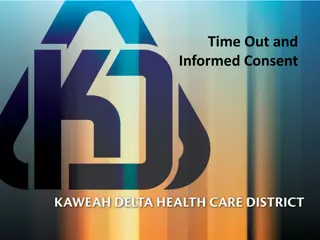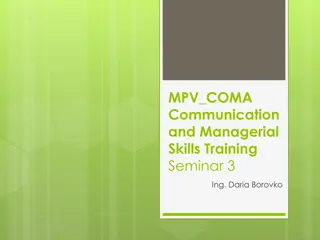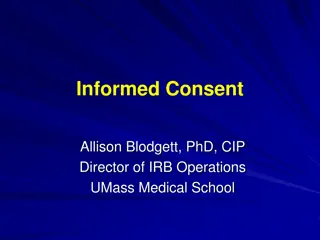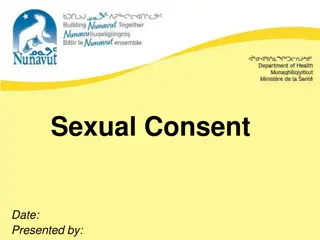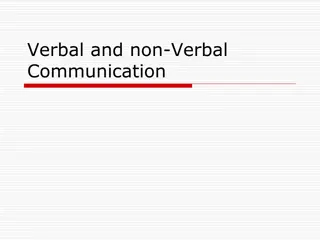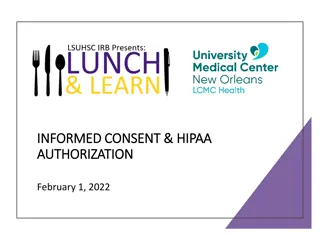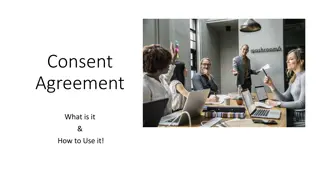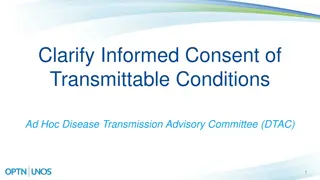Understanding Communication Styles and Advantages of Written Communication
Communication is the process of sharing information through various mediums like verbal, non-verbal, written, and visual. Understanding the communication cycle and different styles - verbal, non-verbal, visual, and written - is crucial for effective communication. Written communication offers advant
9 views • 22 slides
RELATIONSHIPS. ALL ABOUT CONSENT
Explore the meaning of consent, strategies for giving or seeking consent, and real-life examples in relationships. The lesson covers defining consent, respecting boundaries, and communication skills. Learn about the legal definition of consent and how to navigate consent using language and body cues
0 views • 29 slides
Kerala High Court Upholds Divorce by Mutual Consent Ruling
Kerala High Court Upholds Divorce by Mutual Consent Ruling\nBackground of the Case\nKerala High Court ruled that the Family Court was justified in granting a divorce by mutual consent, even though the wife later withdrew her consent. The case involved an appeal by the wife challenging the Family Cou
0 views • 4 slides
Understanding Sexual Consent: A Guide for Secondary Students
This presentation focuses on educating secondary students about sexual consent, emphasizing the importance of communication, respect, and boundaries in any sexual activity. It covers the definitions of consent, its importance, what sexual consent entails, and crucial points to remember about obtaini
0 views • 21 slides
Understanding Verbal Prescriptions in Pharmacy Practice
This comprehensive guide provides insights into obtaining verbal prescriptions, necessary information in a verbal prescription, types of written verbal prescriptions, acceptable sources for verbal prescriptions, authorized personnel to accept verbal prescriptions, laws regarding interns and verbal p
0 views • 18 slides
Understanding Communication and Sign Language
Communication is the vital process of exchanging information, ideas, and emotions through various channels such as speech, signals, and writing. This includes verbal and non-verbal communication, where sign language plays a crucial role. Effective communication depends on the sender, message, channe
1 views • 31 slides
Understanding Communication Skills and Types
Communication is the exchange of information through various mediums like speaking and writing. It can be verbal or non-verbal. Verbal communication involves oral and written forms, while non-verbal communication includes body language and appearance. Each type has its own advantages and drawbacks,
1 views • 13 slides
Understanding Verbal and Non-Verbal Tests
Verbal and non-verbal tests serve different purposes in assessing intelligence and skills. Non-verbal tests utilize images and diagrams to measure reasoning abilities without requiring reading or writing. Verbal tests, on the other hand, assess language-based skills through reading, writing, or oral
0 views • 14 slides
Understanding Modes of Communication and Verbal Messages
Communication occurs through verbal and nonverbal modes, with messages having denotative and connotative meanings. Verbal messages vary in directness, affecting the effectiveness of communication. Indirect messages offer advantages such as politeness and avoiding offense, but can also lead to misund
0 views • 64 slides
Understanding the Importance of Nonverbal Communication in Communication Skills
Nonverbal communication plays a crucial role in conveying messages and signals through platforms like eye contact, facial expressions, gestures, posture, and spatial distance. It includes appearance, body language, silence, time, and space. This form of communication can significantly impact the rec
0 views • 16 slides
Understanding Irony in Verbal, Dramatic, and Situational Contexts
Explore the nuances of verbal, dramatic, and situational irony through examples and explanations. Verbal irony involves saying something different from what is meant, often using humor like puns. Dramatic irony occurs when the audience knows something the characters don't, creating suspense. Situati
0 views • 12 slides
Guidelines for Obtaining Consent in Diagnostic Imaging and Radiotherapy
Seeking patient consent is a fundamental ethical and legal requirement in healthcare. This guideline emphasizes the importance of informed consent in imaging and radiotherapy procedures, highlighting the responsibility of healthcare practitioners to prioritize patient needs, values, and autonomy. Th
0 views • 19 slides
Understanding Consent and Capacity in Wales Safeguarding Procedures
In Wales safeguarding procedures, obtaining consent from adults at risk is crucial for engaging them in the safeguarding process effectively. Consent should be voluntary, informed, and given without influence. It is important to assess mental capacity for valid consent. The decision to report should
1 views • 20 slides
Understanding the CAT4 Assessment and Reports
CAT4, the Cognitive Abilities Test Fourth Edition, assesses students' abilities in verbal, quantitative, non-verbal, and spatial reasoning. It distinguishes between ability and attainment testing and is used to identify academic potential, understand student thinking, determine support needs, highli
1 views • 15 slides
Understanding Consent and Sexual Conduct Law
Exploring topics related to consent, sexual conduct law, and penalties. Covers aspects like age restrictions, marital laws, sexual assault, date rape, sexual battery, and the importance of clear consent. Emphasizes that lack of protest doesn't imply consent and provides insights on what constitutes
5 views • 27 slides
Understanding Consent: Legal and Moral Implications
Consent, as explored by Nancy S. Kim, involves a complex interplay of legal and moral consequences. This concept is context-dependent, relational, and incremental, with varying levels of autonomy interests at stake. Kim's work delves into the conditions, limits, and assessment of consent, shedding l
0 views • 38 slides
Understanding the Informed Consent Process in iRIS
Learn how to efficiently navigate the Informed Consent Builder feature in iRIS for creating consent forms. The process involves selecting a consent template, merging it with application data, editing the document, and submitting it for review within the system.
0 views • 14 slides
Understanding Informed Consent and Confidentiality in Research
Informed consent is vital in research to ensure participants understand the commitments, benefits, and consequences. Confidentiality safeguards sensitive information. This content covers the key aspects of informed consent, who can provide consent, and the importance of protecting participant identi
0 views • 10 slides
Understanding Medicolegal Aspects of Consent in Medical Practice
Consent in medical practice is crucial, serving as a defense against liability. The Nuremberg Code emphasizes voluntary informed consent. Patients have rights to autonomy, and doctors must respect these by obtaining valid consent before treatment. The doctor-patient relationship has evolved due to t
0 views • 42 slides
Variety of Verbal Analogy Questions and Practice Sets
Explore a variety of verbal analogy questions and practice sets focusing on different types of relationships between words. From number series to verbal classification, essential parts, analogies, artificial language, and more, these exercises aim to enhance your verbal reasoning skills and logic. L
0 views • 20 slides
Understanding Semantic Effects in Verbal Short-term Memory
Investigating the impact of semantic knowledge and similarity on verbal short-term memory, this study delves into how imageability of words influences recall. Key findings highlight the influence of semantic relatedness and the imageability effect on memory retention, shedding light on the mechanism
0 views • 47 slides
F.R.I.E.S.: A Guide to Enthusiastic Consent at APRIL Conference 2022
Disability advocates Mels Felton and Whitney Doyle discuss enthusiastic consent, highlighting the importance of inclusive sex education for individuals with disabilities. Consent is defined as permission for sexual activities through effective communication, aiming to empower individuals and promote
0 views • 14 slides
Understanding Verbal Irony and Tone Through Examples
Verbal irony is the expression of words conveying the opposite of their literal meaning. It is not the same as lying and is used to emphasize a point. Tone plays a crucial role in conveying irony, as it can affect how the message is perceived. Sarcasm, though related, has a negative agenda of mockin
0 views • 7 slides
Understanding GDPR Consent and Validity for Data Processing
This presentation provides insights into GDPR consent requirements, focusing on the concepts, components, and validity of consent for processing personal data. It covers essential aspects such as the definition of consent, explicit consent, components of valid consent, imbalance of power considerati
0 views • 22 slides
Guidelines for Obtaining Consent in Influenza Vaccination
This informative content discusses the importance of obtaining consent before administering immunizations, focusing on the flu season of 2018/19. It emphasizes the principles of informed consent, the specific information to be provided, and the considerations for obtaining consent from adults. Addit
0 views • 9 slides
Understanding Consent and Governance in Health and Social Care
The Health and Social Care Act 2008 outlines the importance of obtaining consent for the care and treatment of service users, incorporating regulations from the Mental Capacity Act 2005 and Mental Health Act 1983 where necessary. The Francis report emphasizes the need for informed consent or lawful
0 views • 33 slides
American Legion Revitalization Process and Verbal Consent Resolution
The American Legion Revitalization Process involves district and department coordination to host events, ensure service officer availability, and secure volunteer participation. The Verbal Consent Resolution emphasizes member autonomy in post affiliation transfers, requiring oral permission document
0 views • 21 slides
Importance of Time Out and Informed Consent in Patient Care
Time Out and Informed Consent are crucial components of quality care and patient safety, aimed at preventing wrong-sided or wrong procedures. Time Out involves stopping all activities, positively identifying the patient, and confirming procedure details before proceeding. Informed Consent is a discu
0 views • 5 slides
Effective Sermon Delivery Techniques for Engaging Presentations
Enhance your sermon delivery skills with insights from Dr. Rick Griffith and Ken Davis on the importance of non-verbal communication, proper gestures, audience-oriented movements, and dressing appropriately. Learn how to communicate effectively through both verbal and non-verbal cues for impactful p
0 views • 26 slides
Mastering Non-Verbal Communication in Managerial Skills Training
Explore the intricacies of non-verbal communication, including body language, tone of voice, and facial expressions, in the context of managerial skills training. Learn to detect signs of lying, evaluate interest and criticism, and recognize attitudes such as boredom and defensiveness. Enhance your
0 views • 34 slides
Remote Informed Consent Process for Research Studies
This presentation covers the remote informed consent process for research studies, including defining remote consent, options for electronic informed consent, processes for minimal and greater than minimal risk studies, and guidelines for obtaining consent via electronic or wet signatures. It also d
0 views • 20 slides
Understanding Informed Consent in Research
Explore the significance of informed consent in research through examples like the Tuskegee Study, guidance for investigators, and details on who can provide consent. Learn about different types of consent documentation and subject populations that require special approval.
0 views • 20 slides
Understanding Sexual Consent Workshop Presentation
Join our interactive workshop on sexual consent to learn about what consent entails, how to recognize it, and understand different scenarios. Explore the importance of asking for consent and engage in activities to enhance your knowledge and skills in this crucial area. Discover resources for more i
0 views • 16 slides
Understanding Verbal and Non-Verbal Communication
Verbal communication involves both speaking and listening, with listening being equally essential. It can be classified into sympathetic and empathetic listening, each serving different purposes in understanding others' feelings. Sympathetic listening involves sharing emotions, while empathetic list
0 views • 52 slides
Understanding Informed Consent and HIPAA Authorization Process
Explore the key aspects of the Belmont Report, elements of Informed Consent, tips for drafting it, and the significance of HIPAA authorizations. Review UMCNO policy on the consent process, understand the core and other elements of informed consent, and learn about the selection of participants based
0 views • 21 slides
Understanding Consent Agenda in Meetings
Learn about consent agreements and how they streamline meeting processes by grouping routine items for quick approval. Discover the difference between normal agendas and consent agendas, along with examples of what can be included. Explore the consent agenda process and understand its implementation
0 views • 12 slides
Understanding Informed Consent in Clinical Trials
Informed consent in clinical research is a foundational principle of research ethics, involving the communication process, respect for participant rights, and ethical principles such as autonomy, beneficence, justice, and solidarity. Participants have core rights that need to be upheld, including se
0 views • 54 slides
NSW Consent Reforms: Legislative Changes and Impacts on Sexual Assault Laws
In the past 40+ years, the NSW legislative landscape has seen significant changes in addressing sexual assault, culminating in the recent Crimes Legislation Amendment (Sexual Consent Reforms) Act 2021. These reforms implement recommendations, introduce affirmative consent model, and enhance provisio
0 views • 32 slides
Ethical Challenges in Biomedical Research Consent and Data Control
Advanced bioinformatics research, reliant on large datasets and biobanks, raises concerns about personal data protection and individual consent. Ensuring participant control over data usage, the need for new consent models, and ongoing engagement pose ethical dilemmas in medical research ethics. Ach
0 views • 19 slides
Enhancing Informed Consent for Transmittable Conditions in Transplant Procedures
Proposing solutions to improve the informed consent process for transplant recipients in cases where donors have known transmittable medical conditions. The current policy is vague and burdensome, requiring individual consent for each positive test result, leading to monitoring and enforcement chall
0 views • 19 slides

